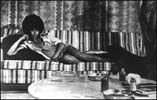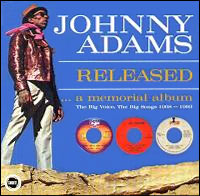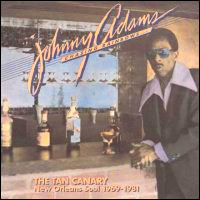Randy's Rodeo
music that rocks, rolls, swings, and twangs
| Artist Index | Song Index | Radio | Home |
|
Music Reviews Special Features Information Support Me |
Sock it to me, Santa!
Johnny Adams' career is marked by three distinct commercial peaks - his recordings for Ric Records (1959-1963), SSS International (1968-1971), and Rounder Records (1984-1998). The first phase springs from Adams' deep roots in the fertile Crescent City. Born in New Orleans in 1932, he got his start there in the mid-1950's singing gospel music, first with the Soul Revivers and later with Bessie Griffin & The Consolators (who recorded briefly for Specialty). Legend has it that Adams was persuaded to convert to secular music when his upstairs neighbor, Dorothy Labostrie (who had previously written "Tutti Frutti" for Little Richard), heard him singing "Precious Lord" in the bathtub. After signing to the New Orleans indie label Ric in the 1959, he recorded Labostrie's "Oh Why," (later retitled "I Won't Cry") with an 18-year-old Mac Rebennack (soon to be known as Dr. John) producing.
By 1962, Johnny Adams' renown had spread far enough that Berry Gordy sought to lure him to fledgling Motown Records; only the threat of legal action by Joe Ruffino halted him. Soon, however, Ruffino died, and Adams left Ric in 1963. His success quickly waned, and he began hopping from label to label - a practice he would continue for 20 years. In the span of five years, Adams worked for Eddie Bo's Gone Records as well as Pacemaker Records, run by legendary Texas impresario Huey P. Meaux, and even cut some singles for famed Los Angeles R&B label Modern Records. Perhaps most importantly, he recorded for Watch Records, a New Orleans label run by producer/arranger Wardell Quezerque. Adams waxed his histrionic interpretation of Ray Price's 1954 country nugget, "Release Me" (revived in 1962 by R&B thrush Esther Phillips), for Watch in 1968.
Adams quickly scored another hit for SSS in 1969 with "I Can't Be All Bad" (#45 R&B, #89 Pop), and the label released his first-ever LP, Heart & Soul, the same year. That album included new versions of several Ric sides, including "A Losing Battle" and "I Won't Cry," which charted as a single in 1970 (#41 R&B). But, his productive tenure at SSS International ended in 1971 after Singleton bought the rich Sun Records catalog and shifted his attention towards that profitable venture. (For a generous sampling of Adams' SSS catalog, see Collectable Records' Reconsider Me, 1996). During the remainder of the decade, Adams recorded with little success for numerous companies. These included major label Atlantic (releasing four singles between late 1971 and early 1973); Mississippi-based indie Ace (A Christmas With Johnny Adams, 1975, later reissued as Christmas In New Orleans); and local New Orleans imprint Chelsea (Stand By Me, 1976). In 1978, he signed to now-defunct Ariola Records America, where he recorded an album called After All The Good Is Gone produced by New Orleans entrepreneur Senator Jones and arranged by Wardell Quezerque. While he dented the charts one last time with the title track (a remake of Conway Twitty's 1976 country hit), and the album earned four stars from Rolling Stone magazine, Johnny Adams continued to toil in relative obscurity. By the late 70's, he was recording for small New Orleans labels like JB, Paid, and Hep' Me (working mainly with Senator Jones), and playing weekends at Dorothy Labostrie's Medallion Lounge with guitarist Walter "Wolfman" Washington. [close]
The problem is, no single compilation exists that ties the disparate periods (and innumerable labels) of Johnny Adams' career into a neat package. Several separate records, though, will do the trick if you're willing to go that far. Rounders' I Won't Cry covers the early years on Ric and Ron (1959-1963), and it is a must-own for any student of New Orleans music. I feel compelled to point out, however, that it's very poorly annotated and unnecessarily brief - containing just 14 of the 20-plus sides Adams cut for these labels, totaling barely over half an hour.
More comprehensive, however, is Released... A Memorial Album (2001), lovingly (if imperfectly) compiled by British reissue specialists RPM Records under their Shout imprint. This disc covers the middle period of Johnny Adams' career from the SSS recordings through his obscure 70's and early 80's sides. At 24 tracks, Released is much more generous than I Won't Cry, but like that disc it contains virtually no track annotation. Further, the label inexplicably includes the 1959 Ric version of "I Won't Cry" instead of the hit SSS version, and they omit another hit ("I Can't Be All Bad") despite a gushing mention in the liner notes. Later, RPM/Shout delved even deeper into Adams' post-SSS period on their 2-CD set, The Tan Canary: New Orleans Soul 1973-1981 (2007). It picks up "I Can't Be All Bad" and is a treasure trove for collectors, but it's much more than casual fans need.
Finally, Johnny Adams' productive later years on Rounder Records are summarized effectively, if briefly, on There Is Always One More Time (2000). In addition to the usual catalog highlights, the disc also collects several tracks not included on previous Adams albums, including "Hard Happy Times," a previously unreleased track penned by Dr. John and songwriting legend Doc Pomus. Rounder followed this with two more surveys, The Great Johnny Adams Blues Album (2005) and The Great Johnny Adams R&B Album (2006). Fans, however, will appreciate all nine original albums that Adams recorded for Rounder during this long, happy twilight of his rich career. Editor's Note: As inferred above, Johnny Adams' life and music are not well documented. Even his CD's rarely list recording dates or personnel. I pieced his story and discography together from broad and disparate sources, including many compiled by ambitious amateurs such as myself. [top of page]
Your witty comments, impertinent questions, helpful suggestions, and angry denials are altogether encouraged. Submit feedback via email; submissions will be edited and posted at my discretion. |
|
|||||||||
Navigation Artist Index Song Index Randy's Radio Home Top Of Page Music Reviews Alternative Blues Books Christmas Classic Rock Country Jazz Lounge Special Features History Of Randy's Rodeo Sex Pistols Motown Records Halloween Valentine's Day Information About Me Feedback Links User's Guide Support Me Amazon iTunes Sheet Music Plus © 1999-2025 Randall Anthony, www.hipchristmas.com and www.randysrodeo.com |
|||||||||||






